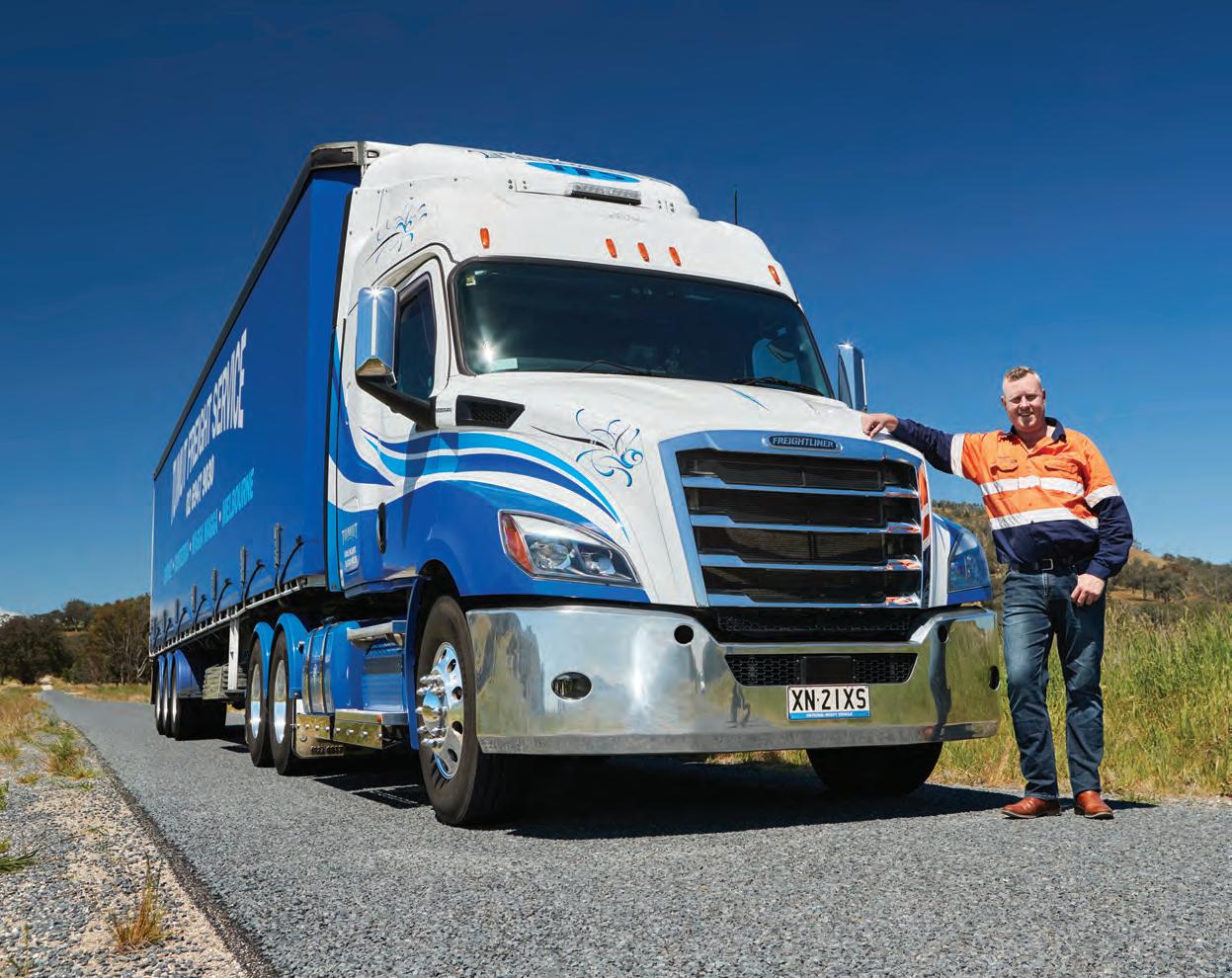
13 minute read
King of the Mountain
Tumut Freight Services is a local family-owned business which has been providing transport services for more than 30 years and is now run by Michael and Tracey Lucas.
Michael Lucas with his new Freightliner Cascadia.
The alpine region requires a versatile truck for the various tasks asked of Tumut Freight Services.
The picturesque Tumut Region is located in the foothills of the Snowy Mountains, and includes the towns of Adelong, Batlow, Talbingo, Tumut and Cabramurra. Tumut is approximately halfway between Sydney and Melbourne and is just 35km from the Hume Highway at South Gundagai, and is conveniently central to Sydney and Melbourne, as well as Canberra and Wagga Wagga. In usual circumstances the mountainous landscape around Tumut can be a challenging environment in which to operate a trucking business and when travelling across the top of the mountain range during winter snow can be often encountered on narrow roads along with temperatures as low as minus nine degrees Celsius. General freight travelling into the region represents the majority of Tumut Freight Services’ (TFS) activities, complemented with carrying bulk timber on the outbound trips. For general freight there are number of regular runs including a single trailer service to Sydney every day, a B-double every day out of Melbourne, a single trailer three times a week out of Canberra, and a rigid every day out of Wagga Wagga. TFS has a contract with a major steel supplier carrying steel products from Sydney and Port Kembla covering southeast NSW through to the Riverina area. The local timber industry was hit hard by the 2020 bushfires and by mid2021 the mills were moving away from recovering burnt timber as most of the usable supply had been exhausted. This was a factor in the local mill in Tumut reverting to just one shift per day, approximately halving output and resulting in around 70 job losses. In a move to remain viable the Tumut mill is taking on an additional role as a distribution centre for Associated Kiln Driers (AKD) and its mill in Colac will perform a similar function for its Victorian customers. A core value of the TFS business is to be reactive and nimble and Michael is able to adapt to changes to suit clients and other transport contractors. Today, TFS operates a diverse fleet with nine prime movers, seven tautliner trailers including two B-double sets, plus five flat top trailers all with container pins to maximise their flexibility. A new flat top trailer spends a lot of its time carrying steel and has a lift axle due to

The Cascadia’s 13-litre Detroit engine is having no troubles with mountain climbs and decents.
occasionally travelling unloaded. “All of the prime movers are generally quite new as we try to turn them over every five years,” says TFS’s Michael Lucas. “Having new equipment on the road is great for the reliability our customers have come to expect from us. They’ll forgive you for the odd breakdown here and there but if you’re constantly ringing up saying you can’t get there because of a breakdown they start looking around because you can’t provide the service they need.” The first prime mover purchased by the company was a 2007 Sterling which has since been retired to yard duties. “The Sterling would do a lot of odd jobs with different trailers,” says Michael. “A flat top one day, the 48-footer the next. It’s done about 1.3 million ‘Ks’ and we put a clutch and gearbox in it last year. It’s now retired back here at the depot as a tug, but it’s still in good enough condition that if we did have a breakdown or an extra load comes up we can jump in and it can do the job.” Michael is the third generation in the business started by his father’s father more than 30 years ago. TFS currently has 15 employees supported by a couple
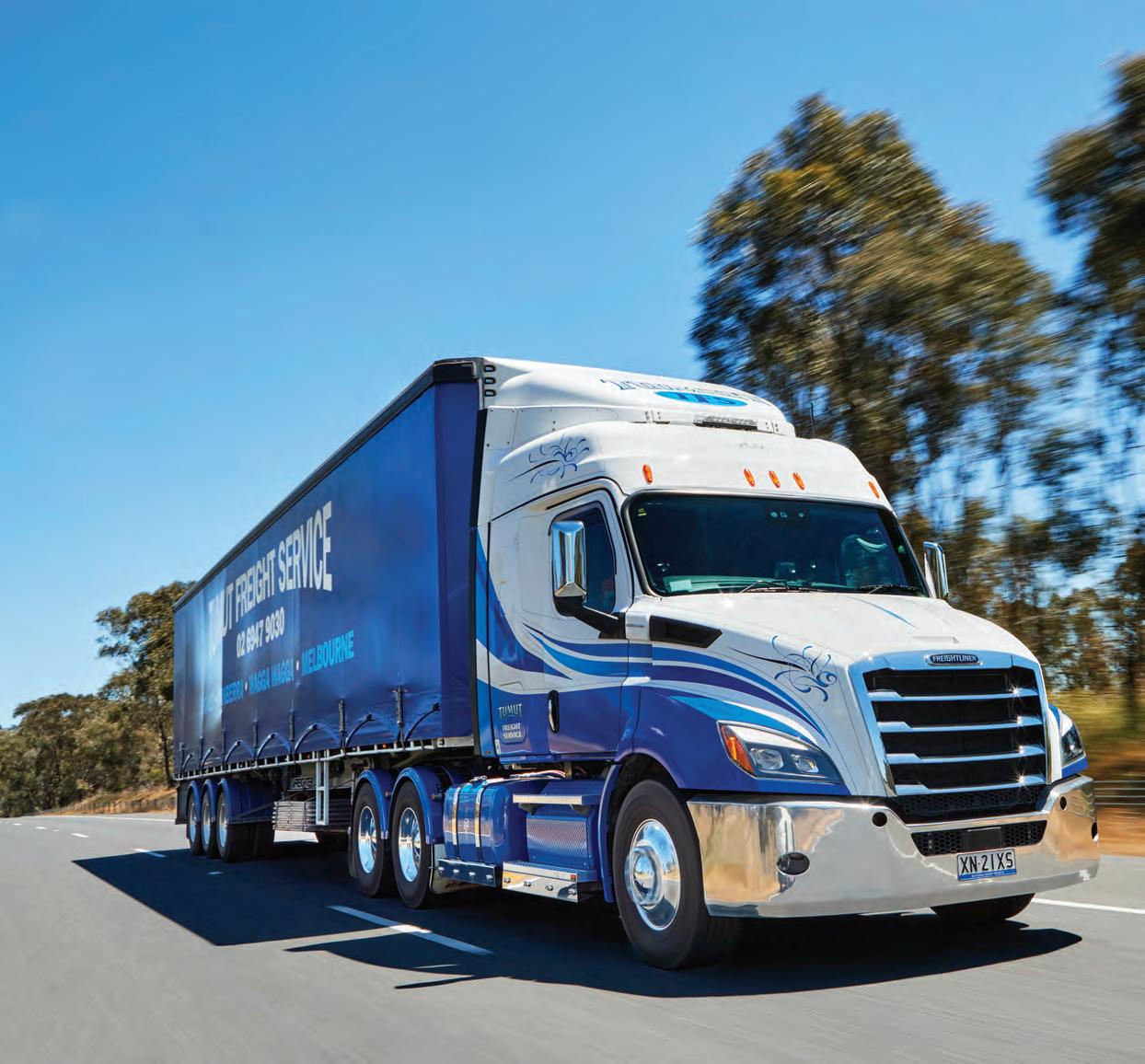
of sub-contractors. “It started with Pop back in the ‘70s with his six tonne tipper carting peas and corn up to the Mountain Maid cannery at Batlow,” he says. “Back then there was also lot of produce from the Tumut Plains such as millet and tobacco.” Michael’s father left the Police Force to take on the business when his own father retired. Growing customer requirements led to regular trips to Melbourne. Towards the end of 2000 Michael started doing casual driving in between studying graphic design at Charles Sturt University. Following the Sydney Olympics, where he trained horses for the Modern Pentathlon equestrian events, Michael joined the family company full time. “I’d been with Dad a lot in the truck as a kid, so a lot of the customers already knew me. We’d do a delivery and they’d ask if we could do something additional,” he recalls. “I started developing the same relationships with customers. The bulk of business has always been general freight back into Tumut and most of the growth has been organic.” The mammoth Snowy Hydro 2.0 project presents some opportunities for TFS even though the project is based on the opposite side of the range at Cooma where the large concrete batching plant and factory to manufacture tunnel segments is located. At times a TFS truck is there once a week. Road access to the construction sites such as Lob’s Hole is via a single direction road on which everyone travels in at a certain time and the direction is reversed later in the day to allow vehicles to leave. This situation calls for meticulous schedule planning and consideration of a situation where a truck and its driver are possibly delayed because of the necessary access arrangements. The majority of TFS’s prime movers are Kenworth, with a DAF based in Sydney. The latest fleet addition however is a Freightliner Cascadia, which has come about largely due to the relationship with Dave Warren who is now the Dealer Principal at Daimler Trucks in Wagga Wagga and Albury. “We’ve always enjoyed a good relationship with Dave and he sold us six Kenworths plus the DAF during his time at the PACCAR dealership,” says Michael. “He knows our business fairly well, knows what we do and where we go. When a demo Cascadia became available Dave sent it up to us, initially for a couple of weeks. We were very busy at the time and ended up having it for a month.” Michael himself took the Cascadia on a single trailer steel run down the coast and then up to Bombala, and then back across the mountains to Tumut. “I gave it a fair old hiding to see what it was like and with the 13-litre engine it handled the coast road very well,” he recalls. “The South Coast has a lot of little, short dips and turns where there is no run up to next hill. The Cascadia wanted to hang on and pull really hard.” Carrying a 25.5 tonne load, Michael was impressed with how well it handled. While performance capability is one thing in the mountains fuel efficiency is important as well. “After the month long trial we did the download through the Detroit Connect telematics which showed an average 2.4 km/l and our own records showed 2.44, which is around 0.15 to 0.2 km better than the other trucks we had been running on that task,” says Michael. “That’s a fair bit of fuel saving over a year or five years.” Equipped with the DT12 automated transmission the Cascadia’s overall top gear ratio of 3.65:1 means the engine is only doing 1420 rpm at 100 kph. The Cascadia’s short bonnet, good manoeuvrability and low tare weight remind Michael of his trusty old Sterling and he is enthusiastic about his first Freightliner and its Detroit Diesel engine. “Obviously they’ve been a success in the US for a number of years, so you feel some confidence that it’s not a totally brand new concept,” he says. “I love the Kenworth brand but up here we needed a truck with the versatility of the Cascadia.” Michael is also impressed with the warranty and servicing arrangements which he has with the Cascadia, just as he is with the Detroit Assurance 5.0 safety features which include Lane Departure Warning, Active Brake Assist, and Adaptive Cruise Control. Tumut Freight Services is successful due to its combination of country charm and service. These are seamlessly combined with big city experience and efficiencies.
BIRDS OF A FEAT
A long-held penchant for premium North American conventional prime movers has led Glenn Nightingale to purchase half a dozen Western Star 4964FXC Constellation prime movers, adding a new dimension to his fleet of 32 multi-combination linehaulers.
Having started his transport business with one European cabover prime mover in 1995, Glenn Nightingale acquired his first Western Star in 1998. This started him on the path of exclusively operating North American prime movers, a decision which he says has served him well over the ensuing years. Glenn’s career in road transport started with a diesel mechanic apprenticeship with a prominent truck manufacturer and progressed to him gaining his heavy-combination and later multi-combination licences. “I really wanted to drive trucks more than I wanted to fix them, so I got into interstate driving and did that for a number of years,” Glenn says. “However, I soon realised that I was busting my butt to help other people pay off their trucks which I might as well be doing for myself.” Then a fortuitous event enabled him to gain his first haulage contract ,which he still holds today. “The guy I was driving for at the time
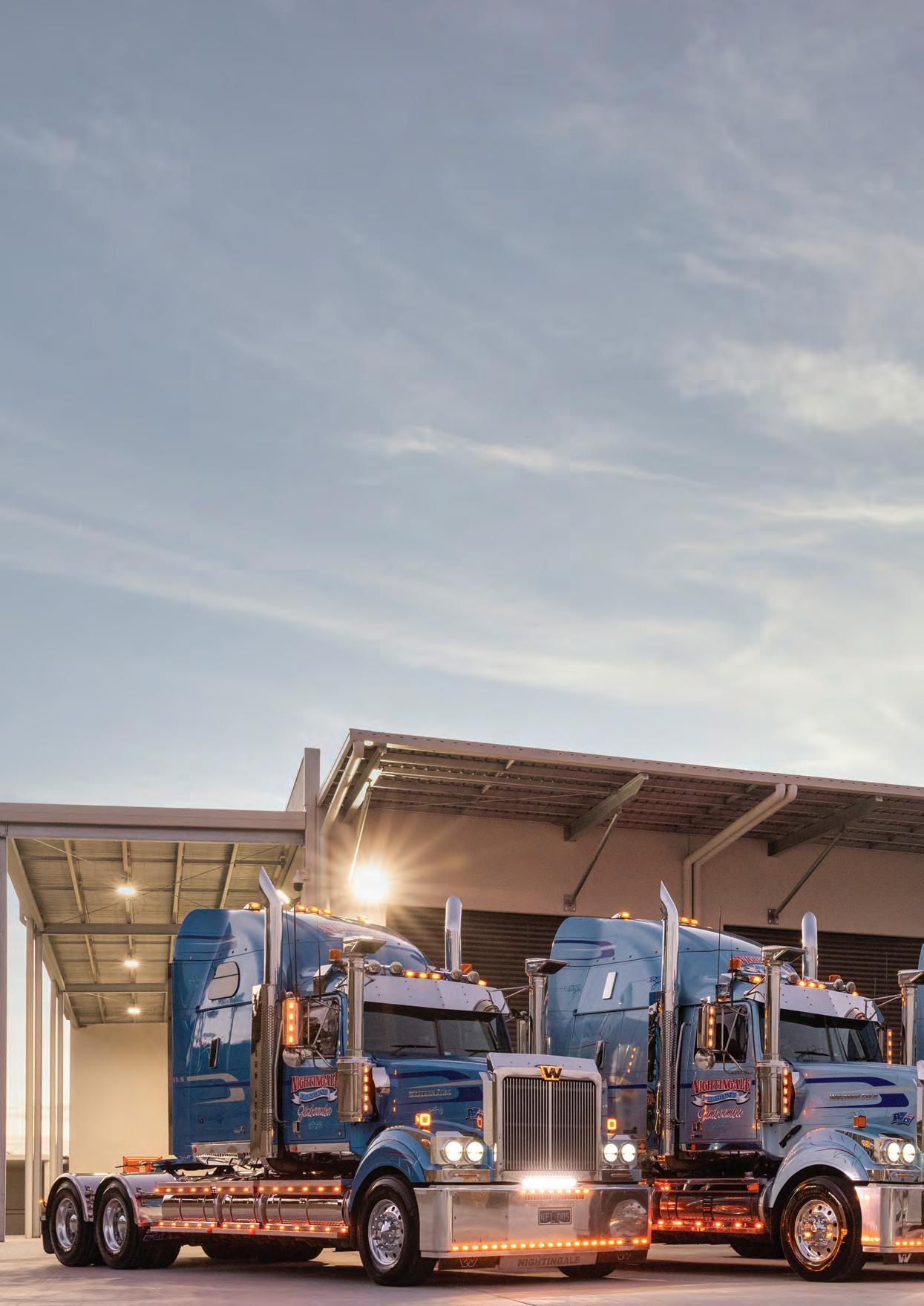
HER
had a good contract carting palletised refractory products including furnace bricks and castings for the steel industry at Unanderra near Wollongong,” Glenn says. “He was planning to retire and offered me first option of taking on the work, which I did, and the job just grew and grew over the following years.” Glenn’s business subsequently went from the initial prime mover to two then three, half a dozen and so on. Today, the company specialises in hauling everything from steel plates, coils and fabrications to precast concrete, commercial machinery and heavy equipment, catering mostly to the mining and civil construction industries. Interestingly, the distinctive metallic blue colour of Glenn’s first Western Star cemented the colour scheme for Nightingale Transport henceforth. The story of how he came to own it reinforces the influence of strong relationships between salespeople and truck operators – along with immediate stock availability when its needed most – in the truck buying process. “I had ordered a bonneted prime mover for the new contract and was assured it was nearly ready, but during a trip to Melbourne I decided to drop in at the factory in Dandenong and discovered to my dismay that they hadn’t even started building it,” Glenn explains. “At my wit’s end and desperate for a new truck so I could fulfil my new contract, I called a mate of mine Ron McKenzie who had just started in Sales with Western Star and he asked, ‘What colour would you like, blue or green?’ Ron flew me up to Brisbane and I chose the blue one to drive back, hence how we came to have our blue
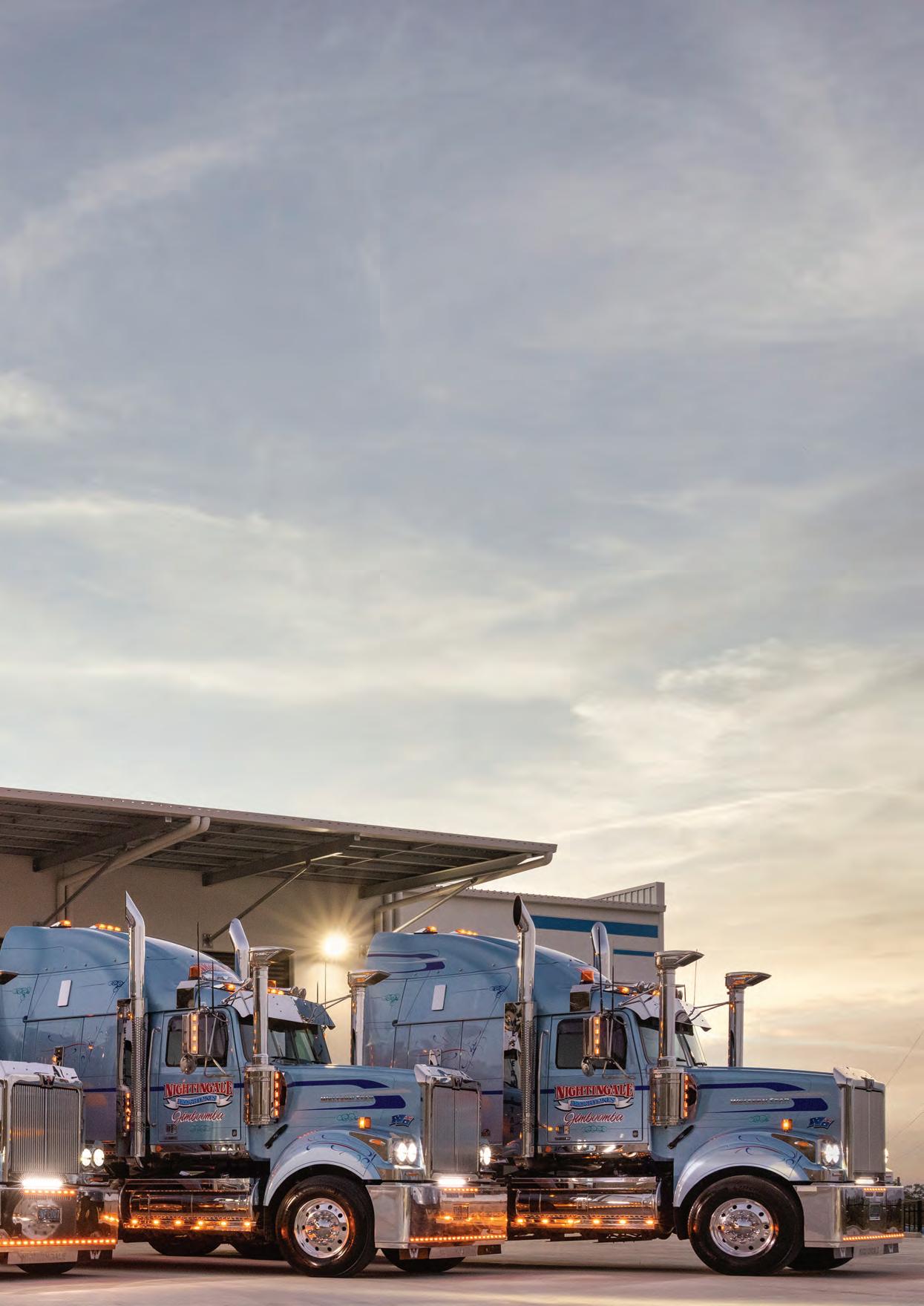
Some of the new Western Star 4964FCX Constellations.
Glenn Nightingale.

fleet colour and also the start of our long association with Western Star.” Nightingale’s work with the refractory company grew in synch with the company’s growth. Its workforce expanded from 28 to 100 staff at one stage and entailed flat-top work transporting the company’s palletised products all over Australia and returning with general freight. Glenn says he kept driving until the company had six trucks, at which point he felt compelled to swap the truck seat for an office chair in order to keep abreast of things. “I had been organising all of our subbies and doing everything from the truck while my then wife managed the paperwork. They were pretty hectic days back then,” Glenn recalls. “Then I employed my cousin and his wife who have both been with me for over 20 years and they now manage the allocating at Unanderra and do a great job.” As the hub of the operation, Unanderra is where Nightingale Transport has its head office and mechanical workshop, with Glenn’s son Jason fulfilling the role of Workshop Manager, overseeing a mechanic, apprentice and yardman. The company also has a Brisbane depot at Yatala where Glenn is based, along with another mechanic and yardman. In regard to the affinity with Western Star trucks, Glenn says he loves the fact that he is able to specify them with a super long wheelbase of 245” (6.2m) and a 68” (1.73m) Stratosphere high-rise walkthrough sleeper. In defence of what could be perhaps construed as over-spec’ing, he contends that his drivers are travelling between 5,000 and 6,000km per week and are often away for long periods and, therefore, deserve to have the extra comfort and convenience these features provide. “Sometimes our drivers don’t get home for up to one month when they’re running back and forth to Perth, for example, so it’s only fair that they have something decent to live in,” Glenn asserts. “You don’t want to be squished up in a confined space and shifting your bags every time you want to get into the bunk.” Other ‘home comforts’ in the Western Stars include microwave ovens, TVs, fridges and Sleeper Air bunk air conditioning. According to Glenn, the Western Stars are all-round solid trucks that are well suited to the harsh Australian conditions, particularly when operating under heavy demand as his do. They are roadtrain rated for a gross combination mass (GCM) of 90.5t. Each of Nightingale’s Western Stars is powered by a Detroit DD15 engine rated at 560hp backed with 1,850lb/ft of torque and Glenn says he has found the Detroit engines to be extremely reliable and durable. He also appreciates the peace-of-mind that comes with the market-leading warranty that fully covers the engine for five years, 1,000,000km, 500,000litres of fuel burn or 15,000 engine hours, whichever comes first.
The plush interior of the latest Western Star purchases.
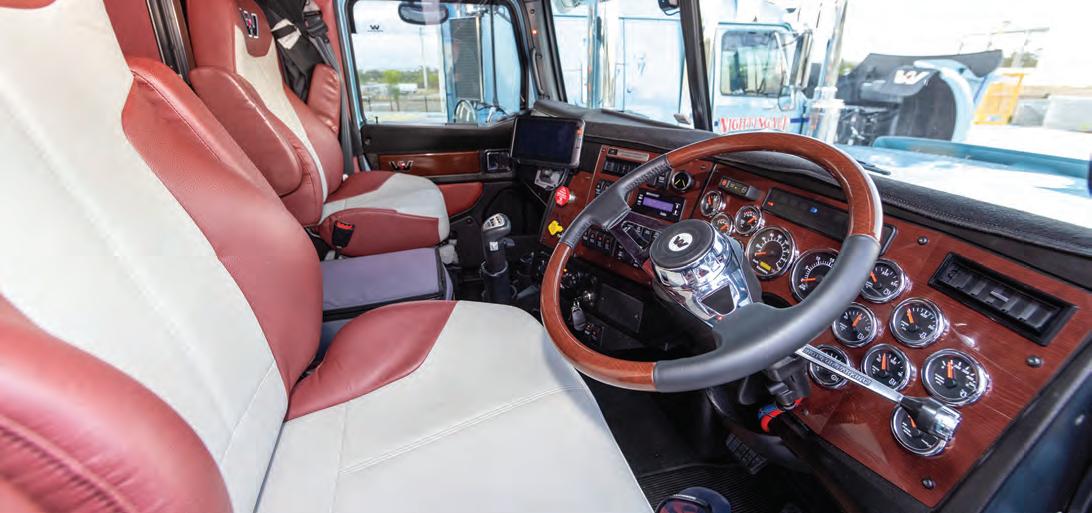
Other durable components in the powertrain include the robust Eaton Fuller RTLO20918B manual transmission running synthetic oil, feeding into a Meritor RT46-160GP tandem drivehead with a 4.30 diff ratio via sealed and lubricated for life Meritor RPL25SD main and RPL20 inter-axle shafts. Rear suspension is Airliner 46,000lb (20.8T) and the steer axle features threeleaf taper leaf springs with threaded pins and bushes. Fuel capacity is just shy of 2,000 litres held in six cylindrical tanks that are stainless-steel wrapped for the ultimate in long-lasting shine. Glenn emphasises the value he puts on the ability of Western Star trucks to be customised to suit the needs and purposes of his fleet. “We reserve a big budget for customisation and all of our trucks are customised to a similarly high standard to reflect the pride we take in them,” he says. As such, the list of custom features both inside and out is extensive, including polished stainless-steel items throughout which match beautifully with the King Bars polished bumper and Alcoa Durabright rims. “Our aim with customisation is to create an impressive vehicle that drives well and provides a comfortable workplace for our drivers,” Glenn says. “The drivers have really taken to the new Western Stars. From an ergonomics perspective the seating is good and the sleeper cab is voluminous with easy access.” Drivers return home after long, arduous trips in good condition and relatively unfatigued according to Glenn, another endorsement for the comfortability of the trucks. Glenn also maintains a very good relationship with the local Penske dealership in Brisbane and in particular Sales Manager Derek Schroff with whom he

These Western Stars are roadtain rated at 90.5 tonnes GCM. has been dealing for more than 15 years. “Derek is excellent at arranging and implementing any specifications we require and has always been there to assist if any issues have arisen,” Glenn says. When it comes to acquiring new vehicles for his fleet, the most important features Glenn looks for are reliability, service prospects, driver experience and return on investment. With his latest batch of Western Star prime movers, Glenn reckons all these criteria are well and truly covered.








